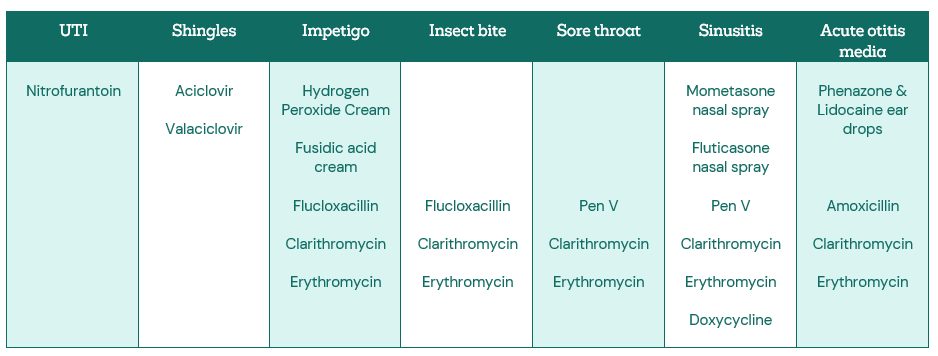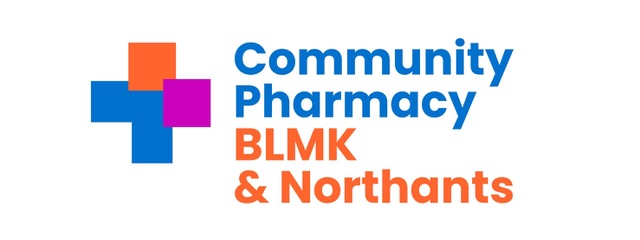Pharmacy First
The Pharmacy First service, which will commence on 31st January 2024 (subject to the required IT systems being in place), is a crucial first step in recognising and properly funding the enormous amount of healthcare advice that community pharmacies provide to the public every day and in establishing and funding community pharmacy as the first port of call for healthcare advice.
What does the service involve?
The new Advanced service involves pharmacists providing advice and NHS-funded treatment, where clinically appropriate, for seven common conditions:
- sinusitis
- sore throat
- acute otitis media
- infected insect bite
- impetigo
- shingles
- uncomplicated urinary tract infections in women.
Consultations for these seven clinical pathways can be provided to patients presenting to the pharmacy as well as those referred by NHS 111, general practices and others.
In the clinical pathway consultations with a pharmacist, people with symptoms suggestive of the seven conditions will be provided with advice and will be supplied, where clinically necessary, with a prescription-only treatment under a Patient Group Direction (PGD) or in one pathway, an over-the-counter medicine (supplied under a clinical protocol), all at NHS expense.
You can locate pharmacies that have signed up for the service by logging in to the NHS Service Finder.
More information about the service can be found on NHS England website.
Changes to PharmOutcomes log in – PharmOutcomes New MFA Process
MFAFAQ (includes fallback paper forms for the seven conditions).
The PharmOutcomes team have created templates to support all elements of the service. There are three key parts to the Pharmacy First service:
1. Minor Illness consultation with the pharmacist.
2. Urgent medicines supply.
3. Clinical pathways consultations supporting the treatment of seven common conditions under a Patient Group Direction (PGD) or protocol.
As parts 1 and 2 are referral services only, pharmacy teams will see many similarities with the existing CPCS templates as far as template design is concerned. This will help to make this service transition as seamless as possible for users.
Pharmacy First User GuidePharmacyFirstServiceGuideV2
The service requirements are included in the service specification and the associated clinical pathways.
Download the service specification and clinical pathways
The 23 patient group directions (PGD) and one protocol for the service will be used to authorise supply of medicines at NHS expense.
Download the final PGDs and protocol
All of these documents will be essential reading for pharmacy owners and pharmacists who will be providing the service.
The Drug Tariff determination sets out the detail of the funding for the service (see also the Funding and claiming payment section below) and the Secretary of State Directions provide the legal basis for the provision of the service.:
Drug Tariff determination and Directions for the Pharmacy First service
Pharmacy First Clinical pathways – medicines included in the PGDs and medicines protocol
Pharmacy First – medicines list for clinical pathway consultations
Distance Selling Pharmacies (DSPs) will be able to provide six of the seven Pharmacy First clinical pathways remotely via video consultations, but may not provide clinical pathways consultations on their premises (due to links with the support for self-care Essential service and restrictions regarding the provision of Essential services on the pharmacy premises).
The acute otitis media clinical pathway requires the use of an otoscope, so that pathway will not be provided by DSPs.
Pharmacy owner checklist: getting going with the Pharmacy First service (updated January 2024)
This checklist details the actions pharmacy owners can start to undertake to prepare to provide the Pharmacy First service, while waiting for further information and resources to be published. A list of important dates for the Pharmacy First service is also included in the Briefing.
Pharmacist checklist: getting going with the Pharmacy First service (updated January 2024)
This checklist details the actions pharmacists (including locums) can start to undertake to prepare to provide the Pharmacy First service, while waiting for further information and resources to be published.
Consultation room
Pharmacies must have a consultation room that will be used for the provision of the service which meets the requirements of the terms of service.
There must be IT equipment accessible within the consultation room to allow contemporaneous records of the consultations provided to be made within the NHS-assured Pharmacy First IT system (see below for further information on IT systems).
Equipment
Where ear examinations are performed within the pharmacy, the pharmacist must use an otoscope. Consequently, all pharmacies providing the service (bar DSPs) must have an otoscope.
Guidance on selecting a suitable otoscope can be found in Annex C of the service specification.
Standard Operating Procedure
Pharmacy owners must have a Standard Operating Procedure (SOP) for the service, which all staff participating in provision of the service must be familiar with and follow.
The SOP must include the process for escalation of any clinical and non-clinical issues identified during the provision of the service. To support this, the pharmacy must have available, signposting details for other local services, contact details for local out of hours and urgent care providers and contact details for the local integrated care board.
Various pharmacy support organisations provide template SOPs which their members can personalise for use in their pharmacy.
Select an IT system
As with the current Community Pharmacist Consultation Service, an NHS-assured Pharmacy First IT system, which meets the minimum digital requirements of the service (as specified within the Community Pharmacy Clinical Services Standard and including an application programming interface (API) to facilitate transfer of data into the NHSBSA MYS portal) must be used by pharmacy owners.
When choosing an IT supplier, pharmacy owners may want to refer to the NHS CPCS IT Buyers Guide.
Sign up to provide the service
Pharmacy owners must notify NHS England that they intend to provide the service by completion of an electronic registration through the NHS Business Services Authority’s (NHSBSA) Manage Your Service (MYS) portal.
Registrations opened on MYS on 1st December 2023; further information is included in the Funding and claiming payment section below.
Pharmacy owners providing CPCS and wanting to provide Pharmacy First must sign-up via MYS; there will be no rollover of the registrations for CPCS to the Pharmacy First service.
Further information can be found on the CPE website
Initial fixed payment
Funding, caps and activity thresholds for the service have been the subject of much negotiation and we are pleased to have secured an initial fixed payment of £2,000 per pharmacy to be made available ahead of the launch.
The initial fixed payment will be reclaimed if pharmacy owners do not provide five clinical pathways consultations by the end of March 2024 (minor illness and urgent medicines supply consultations do not count towards this minimum consultation requirement).
Pharmacy owners can sign up to provide the service from its commencement date and claim the initial fixed payment by making a declaration on the NHSBSA’s Manage Your Service (MYS) portal by 23:59 on 30th January 2024. Declarations could be made from 1st December 2023.
Pharmacy owners who make the declaration on MYS before 23:59 on 31st December 2023 will receive the £2000 payment on 1st February 2024, with those that subsequently make a declaration before 23:59 on 30th January 2024 receiving the payment on 1st March 2024.
Consultation fees and monthly fixed payment
Pharmacies will be paid £15 per completed consultation.
From February 2024, in addition to the £15 consultation fee, a monthly fixed payment of £1,000 will be paid to pharmacy owners who meet a minimum activity threshold of clinical pathways consultations (the threshold will increase over time as set out below).
| Month | Minimum number of clinical pathways consultations |
| February 2024 | 1 |
| March 2024 | 5 |
| April 2024 | 5 |
| May 2024 | 10 |
| June 2024 | 10 |
| July 2024 | 10 |
| August 2024 | 20 |
| September 2024 | 20 |
| October 2024 onwards | 30 |
Competency and training requirements
The pharmacy owner must ensure that pharmacists providing the service are competent to do so, including the use of an otoscope (except for DSPs) and be familiar with the clinical pathways, clinical protocol and PGDs. This may involve completion of training.
The pharmacy owner must keep documentary evidence that pharmacy staff involved in the provision of the service are competent and remain up to date with regards to the specific skills and knowledge that are appropriate to their role, and to the aspects of the service they are delivering.
The Centre for Pharmacy Postgraduate Education (CPPE) has a webpage which details training resources which may help pharmacists preparing to provide the service.
CPPE have also developed, with NHS England, a Pharmacy First self-assessment framework, which pharmacists can use to assess their knowledge in relation to the service and to identify any gaps in their knowledge, which need to be filled.
CPPE Pharmacy First page (including the Pharmacy First self-assessment framework)
The prior learning, knowledge and experience of each pharmacist will vary and consequently each individual will need to reflect on their own learning needs and identify any gaps in their knowledge which they need to fill.
Community Pharmacist Technicians Training
Health Education England are offering NHS funded training for Community Pharmacist Technicians to get ahead with Pharmacy First. Further information can be found on the NHS HEE website.
Webinars
Community Pharmacy England has started a series of webinars aimed at assisting the pharmacy sector in preparing for changes to pharmacy services.
Watch the Pharmacy First: Getting to know the service’ webinar on demand (originally held on 13 December 2023).
Download the slides from the webinar
Watch the Getting ready for launch webinar focused on how to prepare for the service’s launch (originally held on 15 January 2024).
Download the slides from the webinar.



